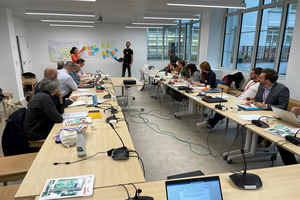News
Launch of a working group on cross-border observation
November 2022
Launched on October 17th 2022 in the ANCT premises, this new network group is co-led by the Communauté d'agglomération de la Riviera Française (French Riviera conurbation community) and the Agence d'urbanisme Atlantique Pyrénées (Atlantic Pyrenees urban planning agency), with the support of the Pôle Analyse et diagnostics territoriaux (ANCT) and of the MOT.
It is made up of a wide range of observation stakeholders: INSEE, Pôle Emploi, urban planning agencies, local authorities, cross-border structures, cross-border observatories, etc.
In the morning plenary session, a round table discussion enabled participants to introduce themselves on the basis of an image or a publication emblematic of their activity. The MOT presented the context and the objectives of the group: to create a space for multi-level dialogue for actors of cross-border observation; to have a map of these actors and to participate in improving knowledge of cross-border situations and trajectories.
These objectives include following up on a survey of local actors which revealed priority needs: the establishment of common indicators, the gradual convergence of cross-border data, the production of common data, improved access to data and sharing of work/methods.
The ANCT continued the morning session with a presentation of its studies and publications on cross-border issues.
In the afternoon, the work continued with two workshops on the issues of observation and production of knowledge about employment and cross-border economic development. These topics will be the subject of a MOT-ANCT publication devoted to cross-border observation, which will be enriched by the local experiences expressed by the members of the group.
The next meeting will be held in spring 2023. In the meantime, the participants wish to benefit from a better understanding of cross-border flows, under various aspects such as employment, energy consumption and the economy.
Back to list
